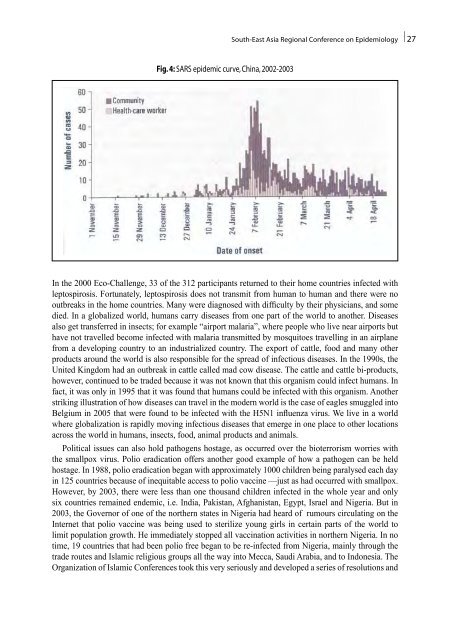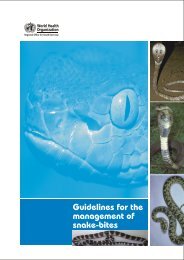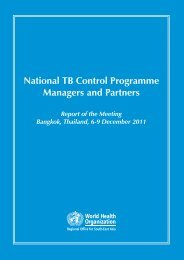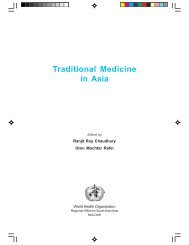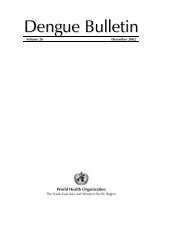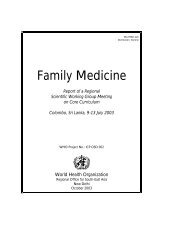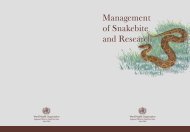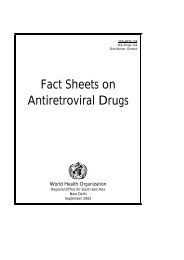South-East Asia Regional Conference on Epidemiology
South-East Asia Regional Conference on Epidemiology
South-East Asia Regional Conference on Epidemiology
You also want an ePaper? Increase the reach of your titles
YUMPU automatically turns print PDFs into web optimized ePapers that Google loves.
Fig. 4: SARS epidemic curve, China, 2002-2003<br />
<str<strong>on</strong>g>South</str<strong>on</strong>g>-<str<strong>on</strong>g>East</str<strong>on</strong>g> <str<strong>on</strong>g>Asia</str<strong>on</strong>g> <str<strong>on</strong>g>Regi<strong>on</strong>al</str<strong>on</strong>g> <str<strong>on</strong>g>C<strong>on</strong>ference</str<strong>on</strong>g> <strong>on</strong> <strong>Epidemiology</strong> | 27<br />
In the 2000 Eco-Challenge, 33 of the 312 participants returned to their home countries infected with<br />
leptospirosis. Fortunately, leptospirosis does not transmit from human to human and there were no<br />
outbreaks in the home countries. Many were diagnosed with difficulty by their physicians, and some<br />
died. In a globalized world, humans carry diseases from <strong>on</strong>e part of the world to another. Diseases<br />
also get transferred in insects; for example “airport malaria”, where people who live near airports but<br />
have not travelled become infected with malaria transmitted by mosquitoes travelling in an airplane<br />
from a developing country to an industrialized country. The export of cattle, food and many other<br />
products around the world is also resp<strong>on</strong>sible for the spread of infectious diseases. In the 1990s, the<br />
United Kingdom had an outbreak in cattle called mad cow disease. The cattle and cattle bi-products,<br />
however, c<strong>on</strong>tinued to be traded because it was not known that this organism could infect humans. In<br />
fact, it was <strong>on</strong>ly in 1995 that it was found that humans could be infected with this organism. Another<br />
striking illustrati<strong>on</strong> of how diseases can travel in the modern world is the case of eagles smuggled into<br />
Belgium in 2005 that were found to be infected with the H5N1 influenza virus. We live in a world<br />
where globalizati<strong>on</strong> is rapidly moving infectious diseases that emerge in <strong>on</strong>e place to other locati<strong>on</strong>s<br />
across the world in humans, insects, food, animal products and animals.<br />
Political issues can also hold pathogens hostage, as occurred over the bioterrorism worries with<br />
the smallpox virus. Polio eradicati<strong>on</strong> offers another good example of how a pathogen can be held<br />
hostage. In 1988, polio eradicati<strong>on</strong> began with approximately 1000 children being paralysed each day<br />
in 125 countries because of inequitable access to polio vaccine —just as had occurred with smallpox.<br />
However, by 2003, there were less than <strong>on</strong>e thousand children infected in the whole year and <strong>on</strong>ly<br />
six countries remained endemic, i.e. India, Pakistan, Afghanistan, Egypt, Israel and Nigeria. But in<br />
2003, the Governor of <strong>on</strong>e of the northern states in Nigeria had heard of rumours circulating <strong>on</strong> the<br />
Internet that polio vaccine was being used to sterilize young girls in certain parts of the world to<br />
limit populati<strong>on</strong> growth. He immediately stopped all vaccinati<strong>on</strong> activities in northern Nigeria. In no<br />
time, 19 countries that had been polio free began to be re-infected from Nigeria, mainly through the<br />
trade routes and Islamic religious groups all the way into Mecca, Saudi Arabia, and to Ind<strong>on</strong>esia. The<br />
Organizati<strong>on</strong> of Islamic <str<strong>on</strong>g>C<strong>on</strong>ference</str<strong>on</strong>g>s took this very seriously and developed a series of resoluti<strong>on</strong>s and


